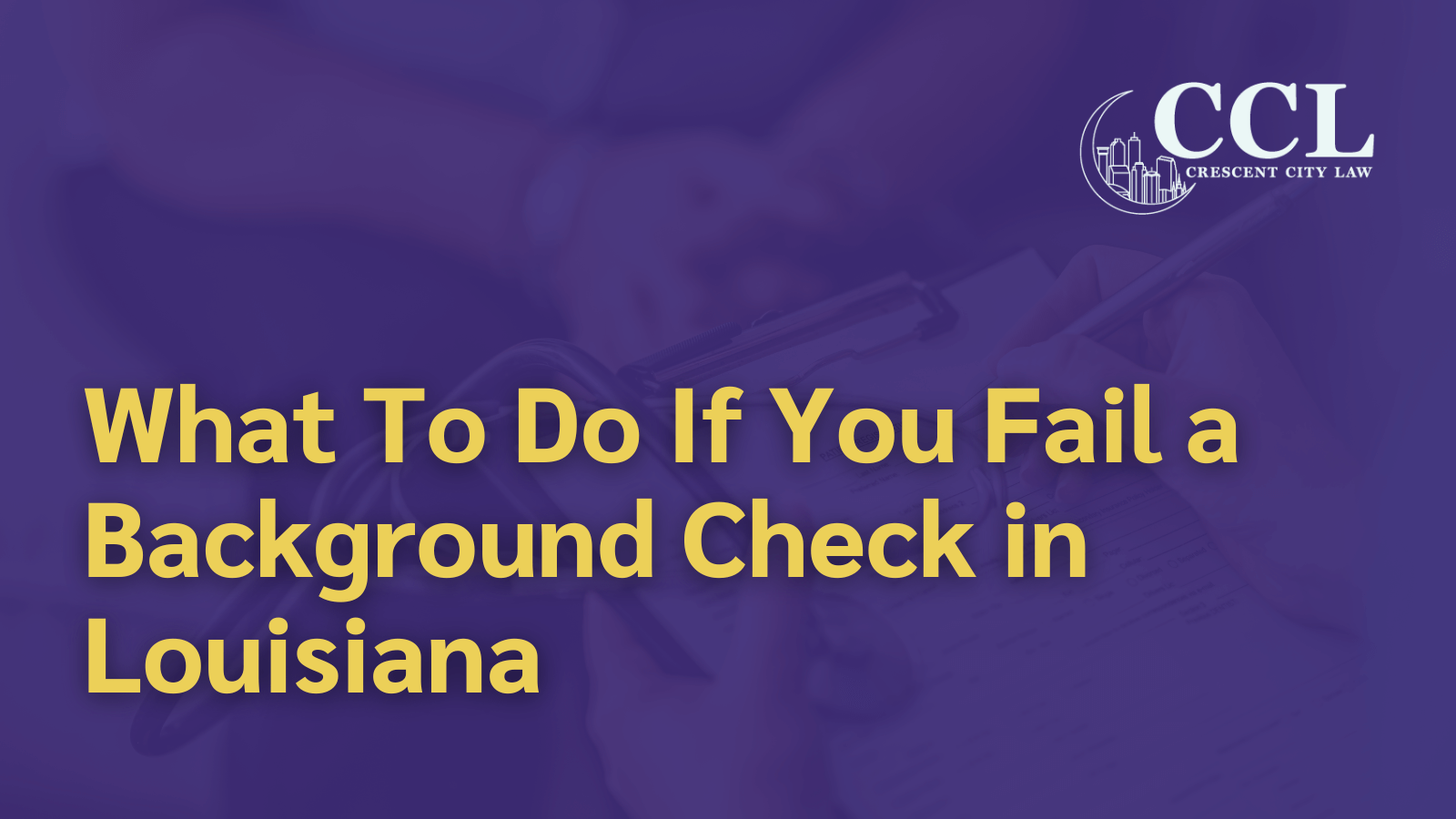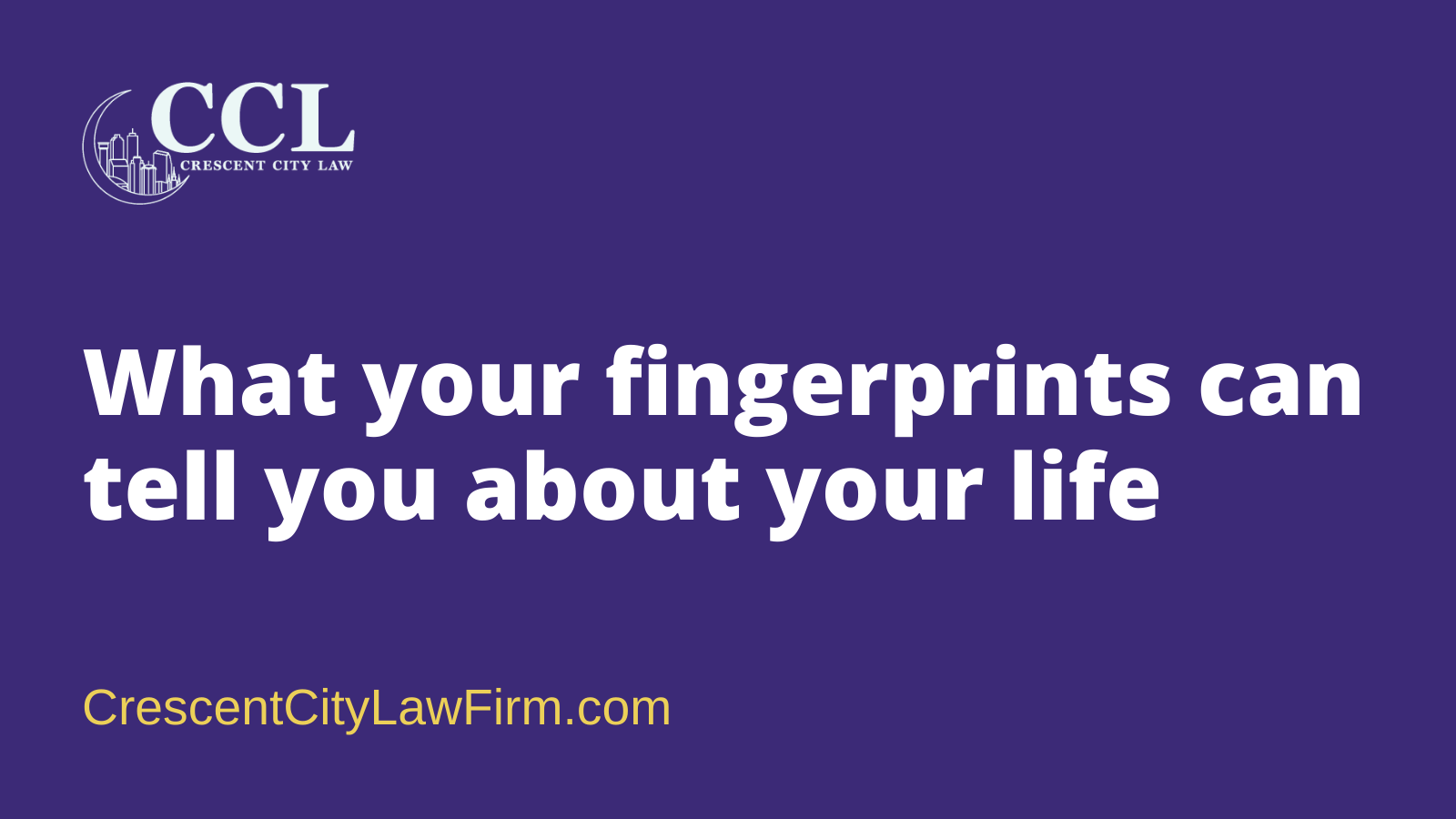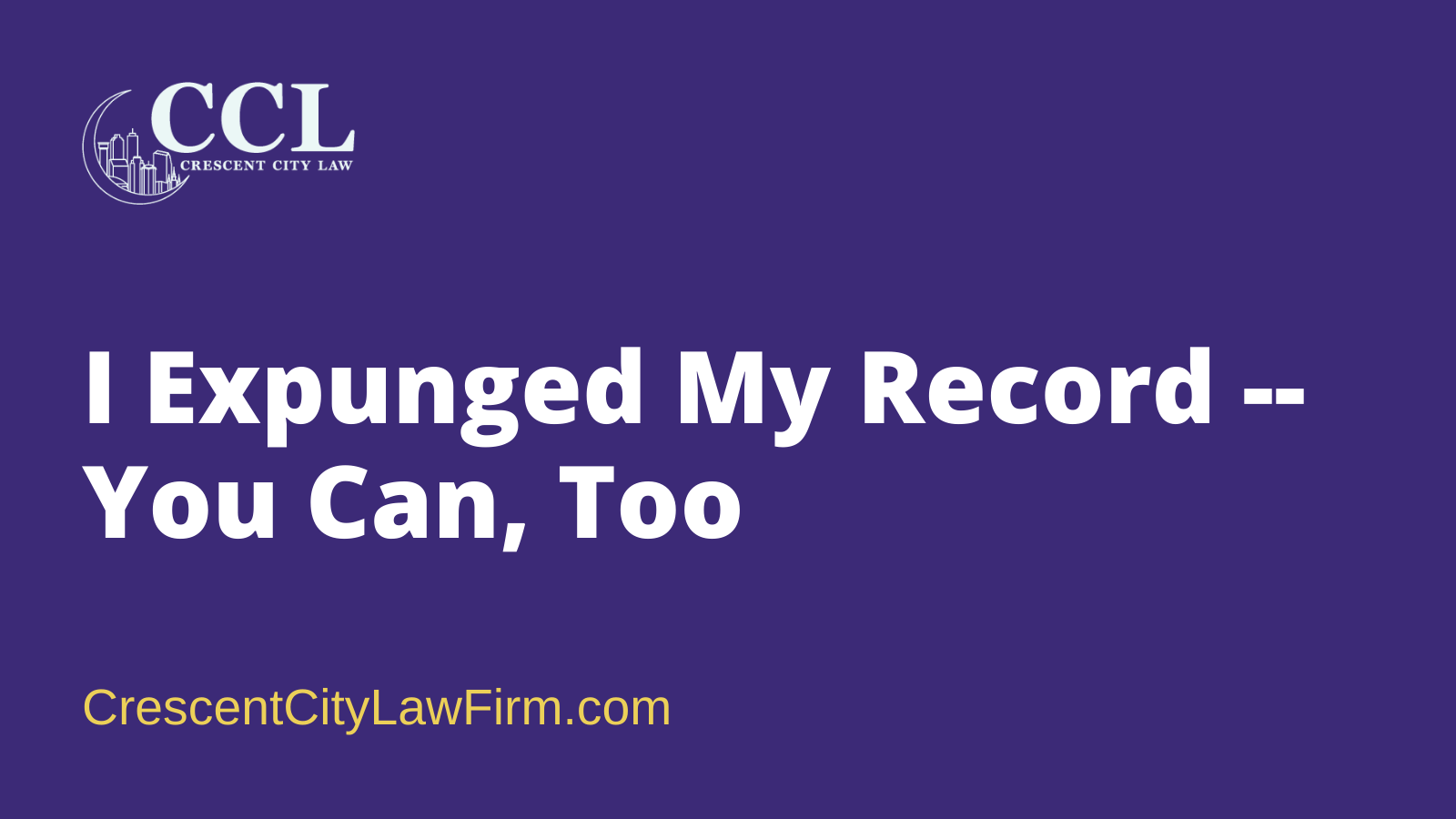”John is the best. He had my 37 year old felony conviction expunged and I didn’t even have to appear in court and miss a day of work. Highly recommend him.
Arthur B.
You Can Always Apply For An Expungement When Your Case Did Not Result In A Conviction
2021 UPDATE of Louisiana expungement laws:
Earlier this year, the Louisiana state legislature was considering passing a “clean slate law.” This law could have automated the process of expunging records, meaning if you met circumstances, you could have your record expunged automatically.
Unfortunately, the bill was blocked by the Louisiana State Police, Louisiana Sheriff’s Association, and Louisiana Supreme Court. They argued that because Louisiana does not have a digital system for keeping track of criminal records, the automatic expungement process would be too much of a burden on their departments. Frankly, we were not in support of this change because we feared many records would not be expunged properly.
In response to the failed bill, the Louisiana Senate appointed a special committee to study how to responsibly limit the collateral consequences of a convict. For example, they asked the committee to study whether a law could be created to stop employers from discriminating against people with convictions after a certain number of years?
Check out our blog post on the law to find out how you can still get your record expunged.
2020 UPDATE of Louisiana expungement laws:
During the 2020 Regular Legislative Session, Gov. John Bel Edwards over 330 several new bills into law, including several that reference the expungement process.
-
Act 71
There are certain qualifications a person must meet in order to be eligible to have an expungement. One requirement in the past has been that, in order to qualify for expungement, a person must be employed for a period of ten consecutive years. Now, that requirement no longer exists.
-
Act 79
When filing for expungement, there are certain fees that must be paid. According to new language, law firms may help their client meet this payment via money order or check, making it easier for the person filing for their expungement. The exact language of the act says, “Payment may be made by United States postal money orders or money orders issued by any state or national bank or by checks issued by a law firm or an attorney.”
-
Act 132
There was another change to the qualifications for expungement, too. With the signing of this act, someone who was not convicted of a crime but instead took part in a pretrial diversion program would now be eligible to file a motion to expunge a record of their arrest.
2019 Update:
During the summer of 2019, the Louisiana legislature made some changes to the existing expungement laws. These changes, which were made effective on August 1, 2019, include the following:
1. Bench warrants
When an expungement order is signed by a judge, the records that must be removed from public access include not only the record of arrest and warrants, but also any bench warrants – a warrant issued when the accused fails to appear in court. Bench warrants can be treated like any other warrants, and police use them to bring the defendant back to the courtroom. In the past, people who expunged their records from public access still dealt with records of their bench warrants, but with the new change to the law, this issue has been resolved.
2. Felony convictions
The legislature also made changes to allow more individuals with felony convictions access to expungement, if:
- The prosecution was dismissed; or
- More than ten years have elapsed since the person completed any sentence or probation for their felony conviction, and the convicted person has not been convicted of any other charge since then.
However, the felony charge cannot be expunged if it was a crime of violence or a sex offense.
ORIGINAL POST: January 23, 2014
Last week, Gov. Jindal signed House Bill 55, which revises the law for expungements in Louisiana. The purpose of the new law is to amend the rules for expungement in Louisiana so they are uniform throughout the entire state while also requiring the same fees and court costs across Louisiana. In order to create a streamlined process, the legislature also created forms that must be used for all expungements.
Changes to the Law for Misdemeanor Expungement
There are a few subtle changes to the law for misdemeanor expungements.
If you are charged with a Misdemeanor:
- You are eligible for expungement after the prosecution is dismissed or the conviction is set aside as a result of Louisiana Code of Criminal Procedure Article 894(B).
- Even if you did not plead under Article 894(B), you are still eligible for an expungement if 5 or more years have passed since your sentence was successfully completed.
- You are never eligible for an expungement for a sex crime.
- You are never eligible for expungement for domestic abuse battery crime.
Changes to the Law for Felony Expungement
Some of the changes to the law are specific to felonies because these crimes are more serious and obviously require more stringent standards to complete the expungement.
If you are charged or prosecuted for a felony:
- You are eligible for expungement after the prosecution is dismissed or your conviction is set aside as a result of Louisiana Code of Criminal Procedure Article 893(E).
- Even if you did not plead under Article 893(E), you are eligible for expungement if more than 10 years have passed since your sentence was successfully completed, as long as you have no open felonies charges and/or you have no felony convictions on your record for the 10 years since the completion of your sentence for the preceding felony.
- You are eligible for an expungement if you were convicted for possession of or possession with intent to distribute a drug.
- You are not eligible for expungement if the crime was for attempted or completed:
- Sex Crimes
- As a caveat to this, there are certain crimes which were defined as sex crimes, but are no longer classified this way. If you were convicted or pleaded guilty to one of these crimes, it is possible you are eligible for an expunction of your record. A careful review of your case by an expungement lawyer will be necessary.
- Any domestic abuse or domestic violence crime
- We are beginning to see some push back from the Louisiana State Police, who maintain the Louisiana Bureau of Criminal Identification and Information, who believe that if the a defendant was arrested as a result of a domestic abuse or domestic violence incident then the defendant is not eligible for an expungement. A skilled expungement attorney should be consulted if your case arose from a domestic disturbance.
- A crime involving a minor who is under the age of 17.
- A crime of violence pursuant to Louisiana Revised Statute 14:2(B)
- You are never eligible for an expungement if you were convicted of, or pleaded guilty to, distribution or manufacture of any drug or controlled dangerous substance.
- Sex Crimes
Under the old law, it was unclear whether a person who was in jail could receive an expungement, however the new law states clearly that expungements for people in prison is not permitted. Additionally, the old law only allowed a person who was convicted or pleaded guilty to a felony was eligible to have only one expungement in their entire life. It appears the new law allows for multiple expungements during a defendant’s life as long as it has been greater than 15 years since the last expunction was granted by the court.
Uniformity of Expungement Rules in Louisiana
There are a number of changes to the law regarding expungement that is updated regardless of whether you are convicted of, or plead guilty to, a misdemeanor or a felony. These include:
- A Hearing may be held 60 days after a Motion for Expungement is filed.
- At the hearing, the defendants-in-rule (the District Attorney’s Office, the Arresting Agency, and the Louisiana State Police) may object to the expunction. They may also waive their objection in writing, if they choose. If a party fails to appear for the hearing, fails to file an objection, or fails to waive their appearance in writing, they forfeit their rights to object the expungement.
- This means that there will be a longer turn-around time for an expungement to be completed.
- The court costs for most expungements are $500.00* (except for Article 894(B) expungements and pursuant to Article 984)
- $250 will go to the Louisiana Bureau of Criminal Identification and Information.
- $50 will go to the arresting agency.
- $50 will go to the district attorney where the arrest took place.
- $200 will go to the Clerk of Court who shall collect all the fees.
- All fees are non-refundable.
- Fees may be waived for:
- An acquittal or finding of not-guilty at trial.
- The District Attorney consents to the expungement and the case was dismissed by the District Attorney.
- The District Attorney consents to the expungement, the District Attorney’s Office refused to prosecute the charges, and time limit for prosecution of the charges has expired.
- The applicant was arrested, but not prosecuted within the time limit permitted by law to file a bill of information or obtain a Grand Jury Indictment.
- The applicant was found factually innocent as a result of a post-conviction relief application.
- A juvenile who has successfully completed drug court.
Expungements for DWIs in Louisiana
There are a few changes and additional requirements to have a Driving While Intoxicated (DWI) charge expunged from your record. If you pleaded guilty to Driving Under the Influence, you are required to submit a certified letter to the DMV that includes a certified copy of the record of the plea, fingerprints of the defendant, proof that the defendant meets the requirements of Louisiana Code of Criminal Procedure Articles 556-556.1 (i.e. DOB, SSN, and DL#) and pay an additional $50 to the DMV for the processing of the motion for expungement by the DMV.
Other Updates Pertaining to Expungements
- A defendant in a multi-defendant case can get an expungement and the name of the expunged person can be removed from the record.
- A person who was arrested for a felony, but is convicted of a misdemeanor can have the felony arrest expunged and can have the misdemeanor conviction expunged. There is no restriction on the number of felony arrests which can be expunged when the felony arrest results in a misdemeanor conviction.
Contact a Lawyer for your Expungement Today
If you were convicted or pleaded guilty to a misdemeanor or felony, and you are wondering if you now have the opportunity to have your arrest or conviction expunged from your criminal record, please feel free to give an experienced criminal defense lawyer at Crescent City Law Firm a phone call at (504) 264-9492or send an e-mail here. I am a New Orleans criminal lawyer with tremendous experience working with clients who have had their convictions removed from their record. It is important to me that your reputation is not harmed and that you and your family can live a normal life. By having your arrest or conviction expunged, it will be easier for you to find work and housing. I am available to you nights, weekends, or off-site for a free initial consultation and can provide a translator, if you need one.






